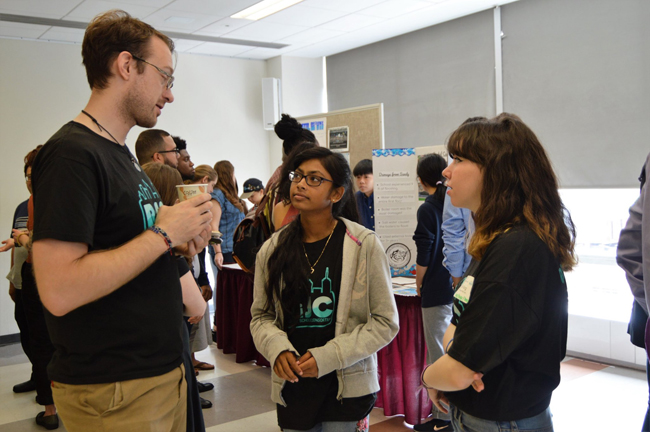
RiSC is a year-long in-school and after-school climate and resilience education program funded by NOAA and FEMA. The program is a collaboration between the National Wildlife Federation, Brooklyn College, New York Sea Grant, the Science and Resilience Institute at Jamaica Bay, and NYC Department of Education teachers and students. Credit (for this and all photos below): Teri Brennan.
Contacts:
Helen Cheng, NYSG’s Coastal Resilience Specialist, E: helen.cheng@cornell.edu, P: (718) 951-5415
Heather Sioux, Project Coordinator, The Resilient Schools Consortium (RiSC), National Wildlife Federation | NYC Eco-Schools, E: SiouxH@nwf.org, P: (845) 464-3443
New York, NY, October 16, 2019 - Climate change brings a swath of challenges to New York City. Sea level rise, flooding events, extreme weather and extreme heat all pose challenges to coastal communities and especially to schools. To educate about and address some of these issues The Resilient Schools Consortium (RiSC) program provides an opportunity for students to not only learn about coastal resilience, but create projects and policy recommendations to directly address the challenges that lie ahead. The first implementation of the RiSC program provided a platform for students’ voices, experiences, and ideas that were then heard at the final Student Summit at Brooklyn College early this past June.
This year’s RiSC summit was preceded by the Year 1 RiSC summit, held after the first year of the program. That summit featured a workshop for resilience projects where, in collaboration with resilience professionals, students discussed improvement opportunities for their school based on their vulnerability audits. Those projects have now either been completed or are underway.
A brief synopsis of the first Resilient School Consortium (RiSC) Summit, held June 2018 in south Brooklyn at City University of New York/Brooklyn College. For more, see "NYSG Aids in Launch of Storm-RiSC, Plans for Springtime NYC Summit."
The Year 2 RiSC summit was co-hosted by the National Wildlife Federation, as well as one of the student members of RiSC from John Dewey High-School student, Faiza Azam MC’d the event. Summit participants included students from six public middle and high schools in coastal Brooklyn. The summit was organized by New York Sea Grant, the National Wildlife Federation, The Science and Resilience Institute at Jamaica Bay, and CUNY Brooklyn College.
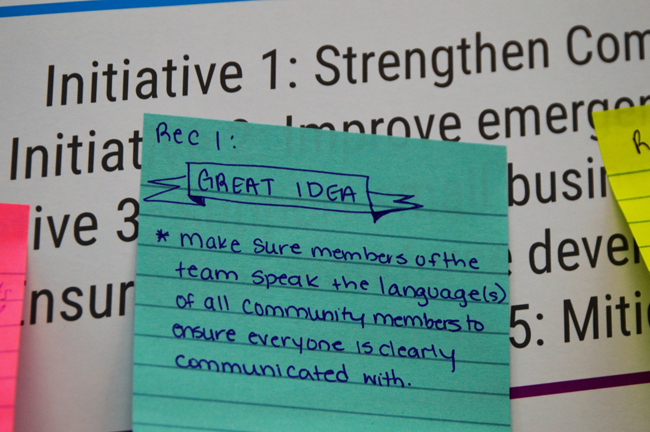
Student visuals were on display before the Summit began.
The summit provided an opportunity for students to speak to an audience with the ability to implement their recommendations. Councilman Justin Brannan, Chair of the City Council’s Education Committee as well as the new Resiliency and Waterfronts Committee attended and provided the keynote at the Summit. Agency partners from NOAA, FEMA, The New York City Mayor’s Office of Resiliency, the NYC Department of Education Office of Sustainability, NYC Office of Emergency Management, and the NYC Department of Environmental Protection, along with representation from several other city and state agencies were also in attendance to listen to presentations and have conversations with students.
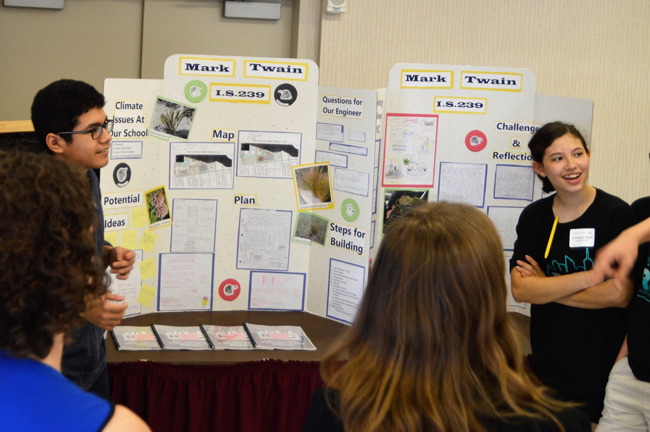
RiSC student teams from five public middle and high schools in coastal Brooklyn (IS 228, IS 239 [Mark Twain, students from which are seen above], MS 88, Rachel Carson High School and John Dewey High School), donning RiSC t-shirts, showcased their knowledge about climate resilience solutions that can protect their schools from the worst impacts of extreme storms, extreme heat, sea level rise, and coastal flooding.
The summit opened with a display of artifacts created by RiSC Teams to convey the resiliency challenges facing their schools and communities. Posters, models and pamphlets designed to communicate those challenges to the public were showcased and inspired conversations with guests about each school’s unique challenges.
Each of the participating schools then presented their resilience projects. Over the course of the last year RiSC teams had the chance to design projects to improve the resilience of their school and surrounding area and were provided funds to construct those projects. Students talked about the rationale for choosing their projects, their experiences on the process of getting projects started, and discussed the resilience project portion of their RiSC experience. Utilizing their funds, research, and partnerships with resiliency professionals, schools have either completed or started to build projects to make their schools and neighborhoods more resilient in the face of the increasing hazards of climate change. Some examples of projects include rain gardens planting native plants and education programs about emergency preparedness
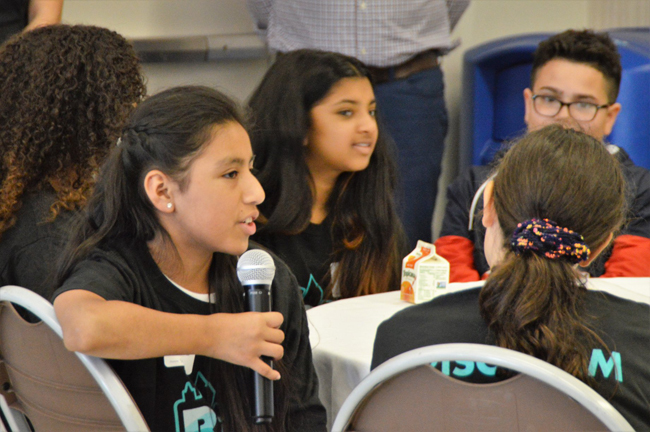
Resilience professionals from city, state, and federal agencies engaged with the RiSC teams and provided feedback on student projects. These included small-scale resiliency projects and Resiliency Guidelines for New York City schools. The students developed the Guidelines to propose how schools can reduce their vulnerability to climate impacts.
The highlight of the day was the discussion of resiliency guidelines. Students and teacher-mentors created guidelines and recommendations to make New York City schools more resilient. These guidelines were displayed on poster-print outs, and students and resilience professionals were able to address and engage with each other and provide feedback and suggestions heard at the summit.
One such suggestion was an “Adopt-A-Shoreline” program. A program like this might give schools the chance to pick a portion of New York City’s shoreline, identify potential improvements, and then participate in stewardship like dune plantings on that stretch of shoreline, engaging their communities in conversations about resilience in the process.
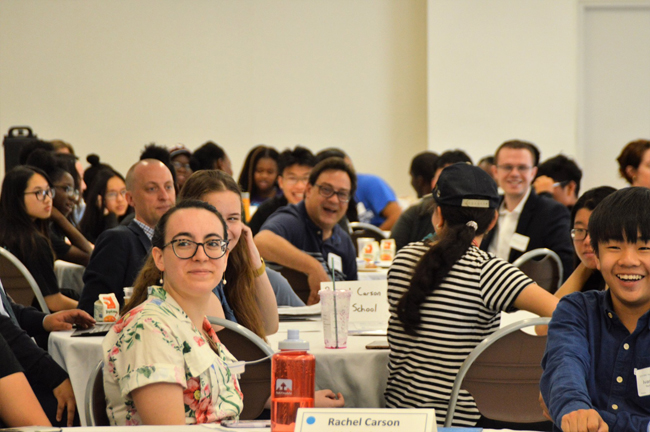
The audience at Brooklyn College's early June RiSC Youth Summit was filled with 100+ attendees.
Funded through a 2016 National Oceanic and Atmospheric Administration (NOAA) grant, the Resilient Schools Consortium (RiSC) project prepares NYC public school students for participation in climate resilience planning with NYC practitioners and decision-makers.
The RiSC program seeks to educate students and provide funding for resiliency projects that they develop and to provide an opportunity for youth voices to be heard by climate resilience practitioners and decision-makers of New York City. The project builds on local resilience plans such as OneNYC, and fosters new partnerships among K-12 schools, informal education institutions, government and non-profit organizations working on resilience planning and implementation.
The RiSC program is a partnership of Brooklyn College, the National Wildlife Federation’s Eco-Schools USA Program, the Science and Resilience Institute at Jamaica Bay, the Brooklyn Marine STEAM Education Alliance, and New York Sea Grant, and is funded by the National Oceanic and Atmospheric Administration (NOAA) Environmental Literacy Grant program.
Students who participated in the RiSC program now have real resiliency project experience to take into future jobs and community roles, but the impact of their voices, projects and research isn’t just reserved for the future.
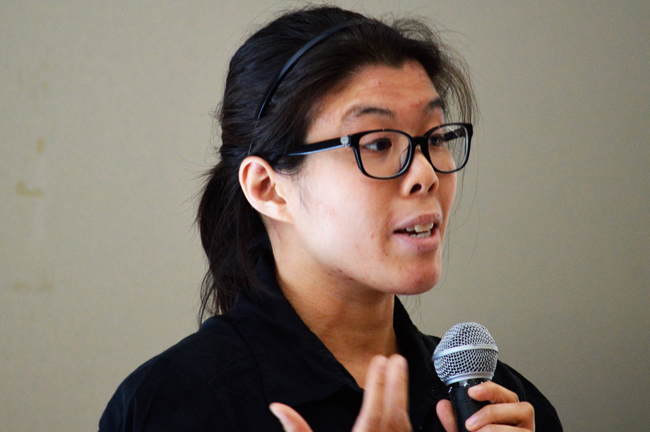
Helen Cheng, NYSG’s Coastal Resilience Specialist at the Science and Resilience Institute at Jamaica Bay, Brooklyn College.
“These kids, who are living and breathing New York City, are going to take after us. It’s important for them to not only learn about climate and resilience, but also to feel empowered and know their voices are really important. Resilience professionals respect and want to learn from these students, which means their voices matter now and can help dictate decisions being made today,” said Helen Cheng, New York Sea Grant’s Coastal Resilience Specialist.
For more information about the RiSC program, visit www.riscnyc.org.
More Info: New York Sea Grant
New York Sea Grant (NYSG), a cooperative program of Cornell University
and the State University of New York (SUNY), is one of 33 university-based
programs under the National Oceanic and Atmospheric Administration’s
National Sea Grant College Program.
Since 1971, NYSG has represented a statewide network of integrated
research, education and extension services promoting coastal community
economic vitality, environmental sustainability and citizen awareness
and understanding about the State’s marine and Great Lakes resources.
Through NYSG’s efforts, the combined talents of university scientists
and extension specialists help develop and transfer science-based
information to many coastal user groups—businesses and industries,
federal, state and local government decision-makers and agency managers,
educators, the media and the interested public.
The program maintains Great Lakes offices at Cornell University, SUNY
Buffalo, SUNY Oswego and the Wayne County Cooperative Extension office
in Newark. In the State's marine waters, NYSG has offices at Stony Brook
University in Long Island, Brooklyn College and Cornell Cooperative
Extension in NYC and Kingston in the Hudson Valley.
For updates on Sea Grant activities: www.nyseagrant.org has RSS, Facebook, Twitter, and YouTube links. NYSG offers a free e-list sign up via www.nyseagrant.org/nycoastlines for its flagship publication, NY Coastlines/Currents, which is published quarterly. Our program also produces an occasional e-newsletter,"NOAA Sea Grant's Social Media Review," via its blog, www.nyseagrant.org/blog.